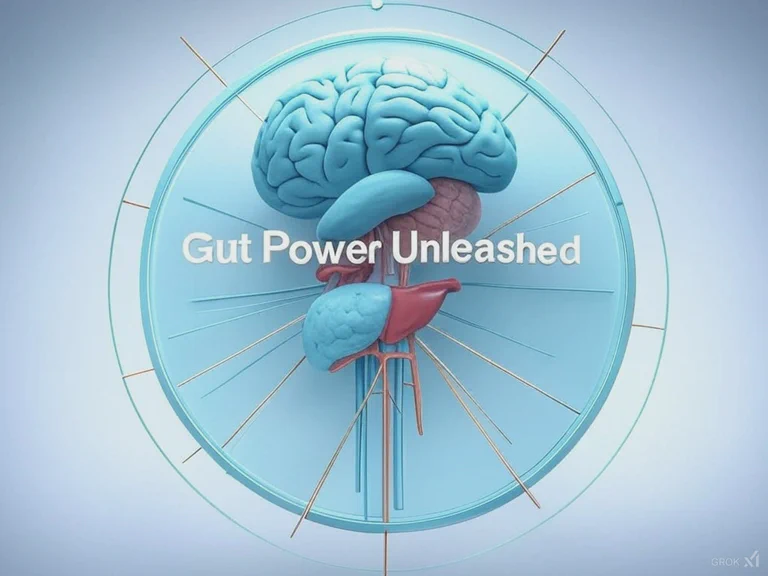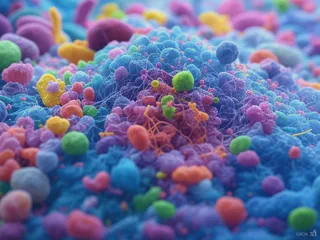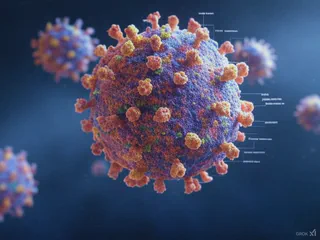Quick Reference Guide
Key takeaways from this comprehensive guide:
- Gut-Body Connection: Your gut influences immunity, mental health, and metabolism
- Core Strategies: Focus on fiber, fermented foods, and stress management ♀️
- Daily Habits: Regular exercise, quality sleep, and mindful eating ♀️️
- Warning Signs: Know when to seek professional help ⚠️
- Personalization: Adapt recommendations to your unique needs
Common Misconceptions ❌
Before diving deeper, let's address some common myths:
- "All bacteria are harmful": Your gut hosts trillions of beneficial microbes
- "One-size-fits-all solutions work": Gut health needs vary individually
- "Probiotics fix everything": They're helpful but not a universal solution
- "Clean eating means sterile": Some exposure to microbes is beneficial
- "Quick fixes work": Sustainable gut health requires consistent habits ⏳
Your gut is far more than just a digestive organ. It's a powerhouse influencing everything from your mood to your immunity, and modern science is unleashing its secrets at an unprecedented pace.
Timeline of Key Discoveries
Ancient Wisdom to Modern Science
Early cultures intuitively linked digestion to overall health. Traditional Chinese Medicine emphasized gut balance long before the microbiome was understood.
The 17th-19th centuries laid the groundwork for our understanding of digestion. Initial anatomical studies identified key nutrients, such as the importance of fiber but the microbial world within remained largely uncharted.
The Dawn of Microbial Understanding
In the late 19th - early 20th century, pioneers like Elie Metchnikoff began exploring the potential benefits of certain bacteria in fermented foods, foreshadowing the "probiotic" concept.
Mid-20th century brought antibiotics, revolutionizing medicine, but early concerns emerged about their broader ecological impact on the body's microbial balance.
Modern Breakthroughs
The late 20th century witnessed the dawn of gut-brain awareness, moving beyond purely digestive functions.
Early 2000s saw metagenomics revolutionizing gut microbiome research. Advanced DNA sequencing technologies unlocked the vast complexity of the gut microbiome, leading to explosive growth in research linking gut microbes to various health conditions.
The Systemic Reach of Gut Power ️
The Gut as a Systemic Regulator
Your gut microbiome isn't just in your body; it's an integral part of your systemic health. It influences:
Immunity
A massive portion of your immune system resides in your gut. Your gut microbes:
- Train immune cells through daily interactions with dendritic cells and T-cells
- Maintain gut barrier integrity by strengthening tight junctions between cells
- Modulate inflammation through balanced cytokine production ⚖️
- Support innate and adaptive immunity via complex signaling networks ️
- Produce natural antimicrobial compounds ⚗️
- Create competitive exclusion against harmful bacteria ⚔️
- Regulate immune cell development and maturation
- Balance pro- and anti-inflammatory responses ↔️
Mental Wellness
The gut-brain axis is a sophisticated bidirectional communication system. Research shows:
- Gut microbes produce over 90% of the body's serotonin
- Influence mood and anxiety through vagal nerve signaling
- Impact cognitive function through neurotransmitter production
- Support vitamin B12 production essential for neural health
- Regulate stress response via the HPA axis ♀️
- Influence sleep-wake cycles
- Affect memory formation and learning
- Modulate pain perception
Metabolic Health
Your gut microbiome plays a key role in:
- Nutrient absorption through enhanced digestive efficiency
- Blood sugar regulation via incretin hormone production 🩸
- Weight management through appetite signaling and calorie harvest ⚖️
- Energy extraction from complex carbohydrates ⚡
- Fat storage regulation and metabolism
- Insulin sensitivity modulation
- Cholesterol metabolism and bile acid conversion
- Amino acid synthesis and protein metabolism
The Microbiome as a Hidden Ecosystem
Think of your gut as a bustling inner city, influenced by:
Diet
What you eat is the primary fuel for your gut microbes. Consider:
- Omega-3 rich foods
- Colorful polyphenols
- Limited processed foods
- Balanced protein intake
- Olive oil and healthy fats 🫒
- Fresh vegetables and fruits
- Whole grains and legumes
- Moderate lean protein
- High-fiber diversity from legumes, grains, and vegetables 🫘
- Polyphenol-rich foods for microbiome support
- Plant protein combinations for complete nutrition
- Strategic supplementation for B12 and iron
- Fermented plant foods for probiotic benefits
- Balanced approach to fat intake
- Importance of fiber-rich low-carb vegetables
- Monitoring gut adaptation periods ⏱️
- Strategic carb cycling options
- Quality protein sources selection
- Systematic elimination approach
- Reintroduction protocols ➕
- Individual tolerance testing
- Alternative food choices
- Long-term management plans
- Fermented dairy products
- Root vegetable variety
- Seaweed and sea vegetables
- Heritage grain options
- Traditional preparation methods
Lifestyle Factors
Your gut health is shaped by:
- Daily meditation or mindfulness practice
- Deep breathing exercises
- Regular nature exposure
- Social connection and support
- Stress-reducing hobbies
- Professional support when needed 🫂
- Moderate aerobic activity ♀️
- Strength training benefits
- Movement throughout the day
- Post-exercise recovery
- Gut-friendly timing ⏱️
- Hydration strategies
- Consistent sleep schedule ️
- Dark, cool environment
- Pre-sleep routine
- Digital device limitations
- Optimal sleep duration
- Recovery practices
- Regular water intake
- Electrolyte balance ⚡
- Herbal tea benefits
- Timing considerations ⏱️
- Quality water sources
- Hydration monitoring
- Meal timing alignment ️
- Light exposure patterns ☀️
- Activity scheduling
- Sleep-wake consistency
- Seasonal adaptations ❄️
- Clean air and water
- Organic food choices
- Natural cleaning products
- Personal care product selection
- EMF consideration
- Toxin reduction strategies
Gut-Organ Symphony: The Systemic Conversations
Key Gut-Organ Axes
Your gut maintains constant communication with vital organs through various pathways:
Gut-Brain Axis
The primary communication channel affecting:
- Mood and cognition
- Neurodegenerative conditions
- Mental wellness
- Psychobiotic responses
Gut-Immune Axis
Critical for:
Other Vital Connections
- Bile acid metabolism
- Detoxification processes
- Nutrient processing
- Inflammation regulation ️
- Metabolic homeostasis ⚖️
- Drug metabolism impact
- Immune cell trafficking 🫁
- Inflammation signaling
- Respiratory health support 🫁
- Microbiome cross-talk
- Barrier function maintenance
- Respiratory infection resistance ️
- Blood pressure regulation 🩸
- Cholesterol metabolism ❤️
- Inflammation control
- TMAO production ⬆️
- Heart rhythm influence
- Vascular health support
- Barrier integrity
- Inflammation balance ⚖️
- Acne regulation
- Eczema management
- Aging processes ⏳
- Wound healing support 🩹
- Calcium absorption regulation
- Vitamin D metabolism ☀️
- Bone mineral density support
- Inflammation impact on bone health
- Osteoblast/osteoclast balance ⚖️
- Hormonal signaling effects
- Retinal protection mechanisms ️
- Inflammatory mediator control ️
- Nutrient delivery optimization
- Age-related condition prevention ⏳
- Oxidative stress management ️
- Visual processing support
- Hormone conversion efficiency
- Nutrient absorption for thyroid health
- Autoimmune regulation ⚙️
- Metabolic rate influence
- Iodine utilization
- Selenium metabolism support
Emerging Connections
Recent research has identified additional vital pathways:
- Gut-Muscle Axis: Protein metabolism and muscle maintenance
- Gut-Reproductive System: Hormonal balance and fertility
- Gut-Pancreas Communication: Digestive enzyme production
- Gut-Kidney Interaction: Fluid balance and toxin removal
Future Horizons in Gut Health
Emerging Research Areas
- Viral-bacterial interactions ↔️
- Beneficial virus populations
- Impact on immune development ️
- Disease prevention potential ️
- Therapeutic applications
- Diagnostic implications
- Microbiome pattern recognition
- Personalized diet algorithms
- Predictive health modeling
- Treatment optimization
- Real-time monitoring systems ⌚
- Digital health integration
- Targeted bacterial therapies
- Designer probiotics
- Metabolite-based treatments
- Precision prebiotics
- Engineered beneficial bacteria
- Microbiome restoration techniques
- Advanced screening methods
- Donor optimization
- Delivery system innovations
- Treatment standardization
- Long-term outcome studies
- Safety protocol development ✅
Next-Generation Technologies
- Microbiome mapping tools ️
- Smart digestive sensors
- Gut-brain interfaces ↔️
- Metabolomic analysis
- Real-time health monitoring ⌚
- Precision fermentation systems
Practical Implementation
- Essential tools: Fermentation jars, high-power blender, steamer 🫙
- Must-have ingredients: Apple cider vinegar, coconut oil, bone broth
- Storage solutions: Glass containers, fermentation weights
- Sample weekly menu
- Batch cooking strategies
- Shopping lists and prep guides
- Symptom journals
- Food-mood diaries
- Digital tracking
- Red flag ingredients
- Hidden sources of gut irritants
- Certification marks to trust ✅
Gut-Friendly Food Guide ️
Foods to Embrace:
- Fermented foods (yogurt, kefir, sauerkraut, kombucha)
- Probiotic-rich foods
- Prebiotic fibers (onions, garlic, leeks, asparagus, bananas)
- Fiber-rich foods (fruits, vegetables, legumes, whole grains)
- Anti-inflammatory foods (fatty fish, walnuts, flaxseeds)
- Polyphenol-rich foods (berries, dark chocolate, green tea)
Foods to Limit or Avoid:
- High processed foods
- Added sugars
- Artificial sweeteners
- Excessive saturated fats
- Potential food sensitivities (gluten, dairy, etc.)
Vitamins and Minerals
Herbal Support
- Adaptogens: Ashwagandha, Rhodiola
- Digestive Support: Ginger , Peppermint
- Anti-inflammatory: Turmeric (Curcumin)
Timing & Combinations ⏰
- Morning Routine ☀️:
- Hydration with lemon water.
- Prebiotic-rich breakfast (e.g., oatmeal with berries and chia seeds). ➕
- Throughout the Day :
- Space meals to allow for digestive rest, aligning with natural circadian rhythms. Remember to be mindful of chrono-nutrition.⏱️
- Combine Vitamin C-rich foods with iron sources to enhance iron absorption. + =
- Supplements :
- Take fat-soluble vitamins (A, D, E, K) with meals containing healthy fats. ➕
- Consider taking probiotics on an empty stomach or as directed by the product label.
- Evening :
- Avoid heavy meals close to bedtime. ❌
- Wind down with stress-reducing practices (meditation, deep breathing).
Conclusion
Your gut microbiome is a powerful force for systemic wellbeing. By embracing these personalized approaches and staying informed about the latest research, you can harness your "gut power" for optimal health.
Disclaimer: This article is for informational purposes only and does not constitute medical advice. Always consult qualified healthcare professionals for personalized guidance.
Further Reading
- Gut: The Inside Story of Our Body's Most Underrated Organ by Giulia Enders
- The Mind-Gut Connection by Emeran Mayer
- Fiber Fueled by Will Bulsiewicz
- Brain Maker by David Perlmutter
- The Clever Guts Diet by Michael Mosley


